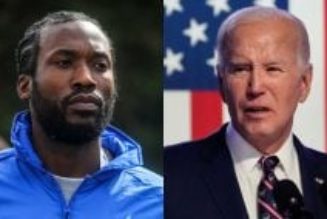
Future’s “Wait For U” has quickly become one of the year’s biggest hits, as the Drake– and Tems-featuring R&B track logs another frame in this week’s Hot 100 top five. And an integral part of the song’s success — like many other recent hits in the genre — is that fans helped choose it.
I Never Liked You marked Future’s eighth No. 1 project on the Billboard 200, bowing with 222,000 equivalent album units in the U.S. in the week ending May 5, according to Luminate – the biggest week for any 2022 album at that point and the biggest first-week number for any Future solo album. During the same week that I Never Liked You debuted at No. 1, “Wait For U” raced to the top of the Hot 100 as the clear focus track from the album.
[embedded content]
Yet the song, which sits at No. 3 in its seventh week on the chart, was unveiled at the same time as the rest of album, not released beforehand to build anticipation. Justin Duran, vp of marketing at Epic Records, says that the rollout strategy for I Never Liked You hinged upon two factors: the nearly two-year gap between the rapper’s projects — notable for an artist as prolific as Future — and the sky-high quality of what Duran calls “an incredible body of work.”
“Those two factors were really important in the decision to release [the album] without too much of a pre-release strategy, going to radio with a single and whatnot,” says Duran.
With streaming the dominant form of consumption for hip-hop (92.2% of all on-demand streaming consumption in 2021, according to Luminate), increasingly labels and their A-list artists are opting to serve their main courses without any appetizers. Over the past year, artists like Drake, Kendrick Lamar, Young Thug and Gunna have also scored No. 1 album debuts on the Billboard 200 chart without releasing traditional singles first. (Drake’s actually done it twice now in less than a year: with last September’s Certified Lover Boy and Honestly, Nevermind, which he released with a few hours’ notice on Friday.) For all of these releases, excitement has been so high that fan interest has driven tracks to the top 20 of the Hot 100 during the debut week — from Drake with his chart-topping “Way 2 Sexy” from Certified Lover Boy to Gunna’s internet-dominating “Pushin P” from DS4Ever.
For I Never Liked You, Future, his management and label were all in agreement: put out the whole album, then react accordingly. “Some artists just have a great product, and the fans want that product,” adds Duran. “And you just have to make sure that you don’t dilute the product by doing too much prior to release — give them what they want, then strategize once it’s out.”
The strategy remains mostly endemic to mainstream hip-hop, as big pop albums by Harry Styles and Adele recently rolled out with focal-point lead singles; the trend also isn’t quite universal, as recent albums by major rap artists like Post Malone and Jack Harlow have been preceded by traditional singles, too. However, it’s worth noting that Bad Bunny also adopted the tactic last month for his Un Verano Sin Ti project, with all 23 songs arriving in one fell swoop. The lack of pre-release singles hasn’t hurt the album one bit: six of the album’s songs are still in the top 40 of this week’s Hot 100, over a month after its release.
By announcing an album a few days or weeks ahead of its release, but holding back any music until the full body of work is unveiled, artists can conjure excitement (and, potentially, collect pre-orders) for a project and turn its release into more of an event. From there, they can swiftly react to listener feedback to build on momentum from early fan favorites, and score smash singles. As more artists adopt an everything-all-at-once strategy, their teams have had to adjust their methods of engineering hits, and when to focus a commercial push on one song over another.
In the case of I Never Liked You, Duran says that “Wait For U” was one of a handful of songs that Future’s team “felt very strongly about upon release.” And when early indicators confirmed that “Wait for U” was the standout track in the days following the album release, a concerted push was made behind the song — including a music video that dropped on the final day of the tracking week — to “get as much momentum out of it as we could during the first week of release,” says Duran, “and secure that No. 1 record and No. 1 album.”
Streaming programmers and radio PDs have had to make similar changes in order to quickly identify the songs that should be in heavy rotation, or atop a prominent playlist. “When the label drops an album, I want to know what the audience feels is the best record — and sometimes, records that stream really well might not work for radio,” says Reggie Rouse, WVEE (V103)/Atlanta vp of programming and brand manager. “We constantly have to evolve and change. So for me, this is an easy adjustment.”
On Spotify, the strategy is based on platform data, listener feedback and social media chatter, says Carl Chery, the streamer’s head of urban music. “Sometimes it’s immediate, you see something standing out,” he says. “Other times, you have to let people digest [the different songs] and a week later you can say, ‘Okay, this is the one that’s sticking.’”
Lamar’s Mr. Morale & the Big Steppers album, for example, arrived last month to huge fanfare as the rapper’s first album in five years. While Mr. Morale launched on May 13 with more immediate songs like “N95” and “Die Hard” near the top of Spotify’s New Music Friday playlist, “Silent Hill,” a grittier anthem featuring Kodak Black, developed strong listenership in the days after the album release, and was moved towards the top of RapCaviar on Spotify. “Silent Hill” is charting the highest of any Mr. Morale song on this week’s Hot R&B/Hip-Hop Songs tally at No. 12, three spots ahead of “N95.”
[embedded content]
This trend of albums arriving without pre-release singles has largely been limited to A-listers with long track records of success, and may not expand beyond music’s upper tier. “If you’re an iconic artist with a far-reaching fan base, you can drop [an album] without a single,” says Geo Cook, brand manager and director of operations at Dallas hip-hop station KKDA (K104). “But if you’re an artist that’s not at that level, I think following the path of the pre-release single may be a better strategy…. If you want to be a star, you still need the power of radio to amplify hits, build your brand and expand your opportunities.”
In the meantime, superstars and their teams can wait to see which song from a project most strongly connects with fans before committing resources to their marketing plans. This isn’t a new phenomenon in the age of TikTok. But by releasing albums without lead singles and monitoring audience reactions, major artists can place even more emphasis on listener feedback as a means of hit creation, and amplify what the people want to hear.
“The beauty of our business now is that you may think you know something, but the public will tell you differently,” says Duran. “Some of the best data will be available once you release the music.”
[flexi-common-toolbar] [flexi-form class=”flexi_form_style” title=”Submit to Flexi” name=”my_form” ajax=”true”][flexi-form-tag type=”post_title” class=”fl-input” title=”Title” value=”” required=”true”][flexi-form-tag type=”category” title=”Select category”][flexi-form-tag type=”tag” title=”Insert tag”][flexi-form-tag type=”article” class=”fl-textarea” title=”Description” ][flexi-form-tag type=”file” title=”Select file” required=”true”][flexi-form-tag type=”submit” name=”submit” value=”Submit Now”] [/flexi-form]

![Run the Jewels’ RTJ4 Adult Swim Concert to Feature Zack De La Rocha, Josh Homme, and Mavis Staples [Updated]](https://www.wazupnaija.com/wp-content/uploads/2020/10/run-the-jewels-rtj4-adult-swim-concert-to-feature-zack-de-la-rocha-josh-homme-and-mavis-staples-updated-327x219.jpg)






![EDM.com Playlist Picks: ACRAZE, Chee, HI-LO and More [09/07/22]](https://www.wazupnaija.com/wp-content/uploads/2022/10/edm-com-playlist-picks-acraze-chee-hi-lo-and-more-09-07-22-327x219.jpg)

Tagged: entertainment blog, epic records, marketing, music, music blog, R&B/Hip-Hop, Streaming